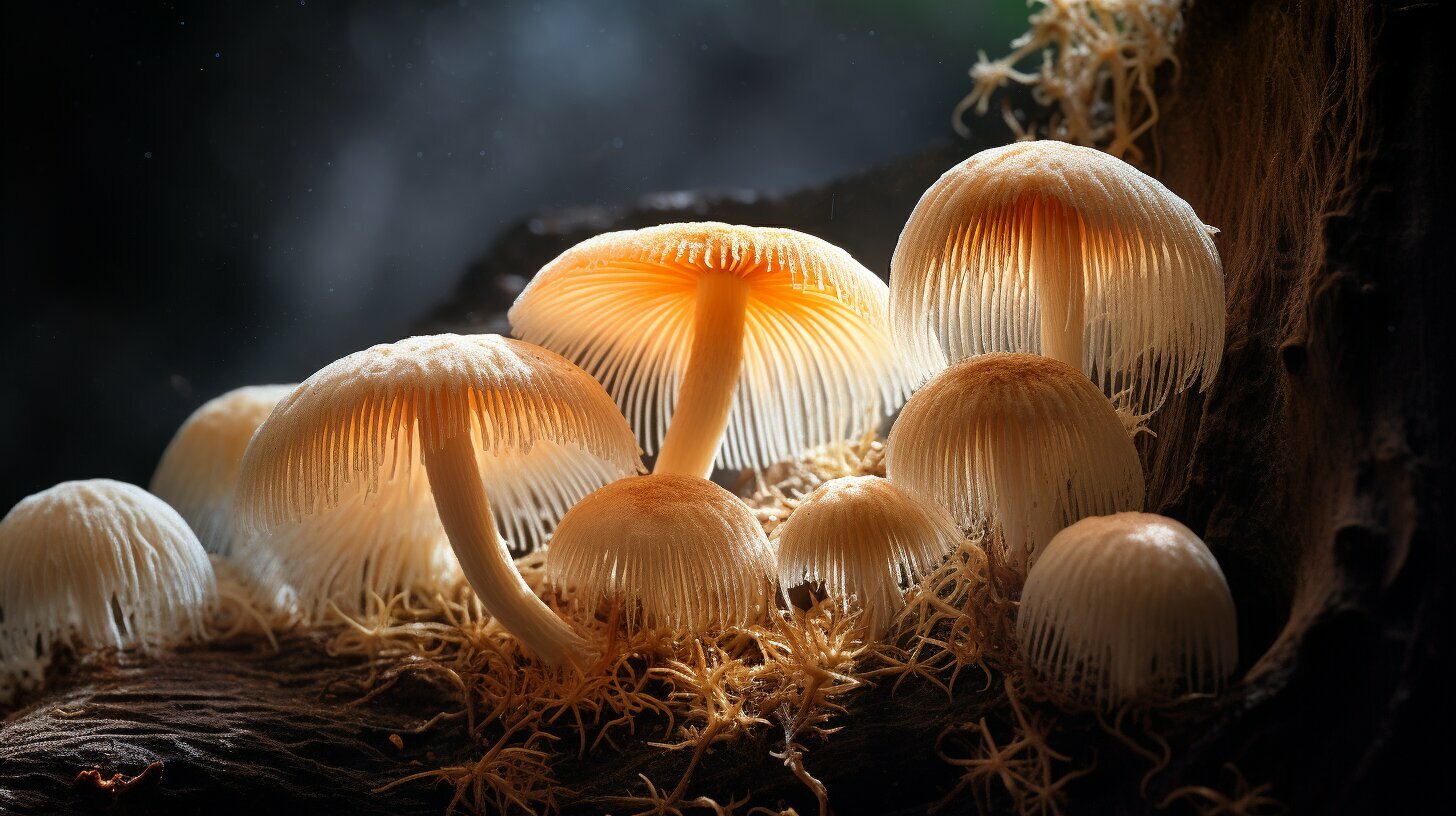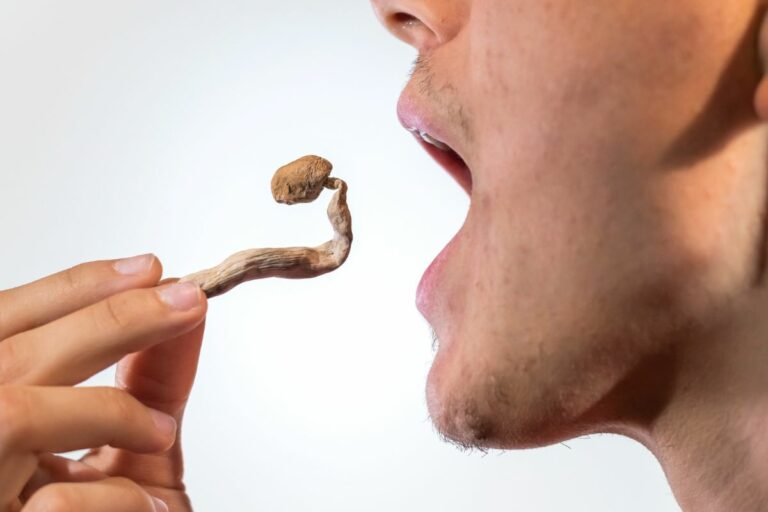Lion’s Mane mushrooms can be eaten raw, but most people prefer to cook them for better taste and texture. When consumed raw, Lion’s Mane mushrooms can have a slightly bitter flavor and a tough, fibrous texture. Although raw consumption is safe, cooking Lion’s Mane mushrooms enhances their flavor and breaks down their cell walls, making them easier to digest. Additionally, cooking helps eliminate any potential germs that may be present on raw mushrooms.
Key Takeaways:
- While Lion’s Mane mushrooms can be eaten raw, cooking them is preferred for better taste and texture.
- Raw Lion’s Mane mushrooms can have a slightly bitter flavor and a tough, fibrous texture.
- Cooking enhances the flavor of Lion’s Mane mushrooms and makes them easier to digest.
- Cooking eliminates any potential germs present on raw mushrooms.
- For optimal taste and nutritional benefits, it is recommended to cook or use dried or powdered Lion’s Mane mushrooms.
Taste and Texture of Raw Lion’s Mane
Table of Contents
When eaten raw, Lion’s Mane mushrooms can have a slightly bitter flavor and a tough and fibrous texture. These unique characteristics can be attributed to their high protein and fiber content, which can make them an acquired taste for some individuals. The bitterness is often described as mild and can be balanced with other flavors when used in dishes.
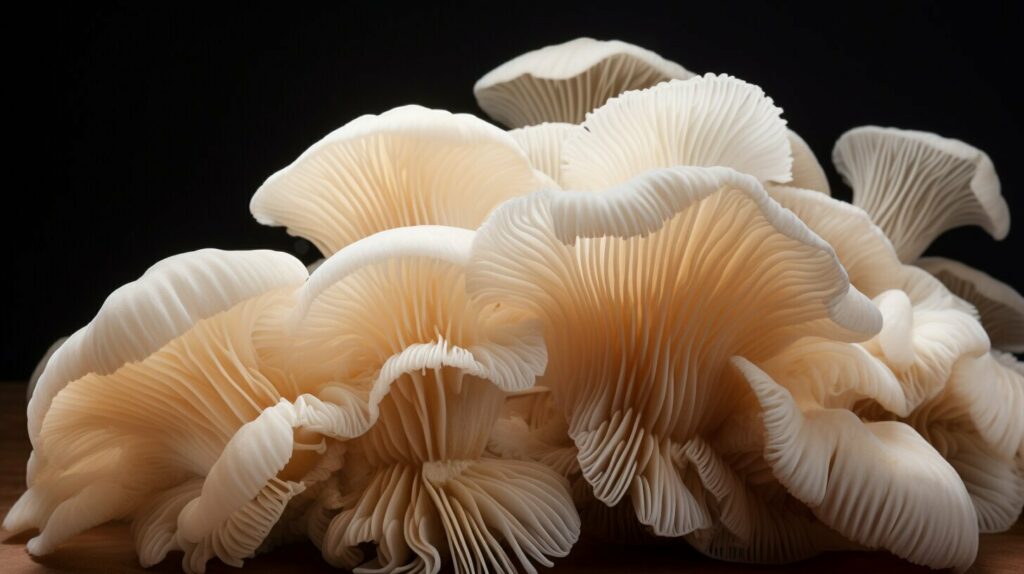
The texture of raw Lion’s Mane mushrooms is often compared to seafood, specifically crab or lobster. The delicate, stringy appearance of the mushroom’s flesh resembles the strands of these crustaceans, adding an interesting element to dishes. However, the fibrous texture can be challenging to chew and may not be enjoyable for everyone.
While some adventurous eaters appreciate the unique taste and texture of raw Lion’s Mane mushrooms, most people prefer to cook them to enhance their overall culinary experience. Cooking helps soften the tough fibers, making the mushrooms more tender and palatable. It can also mellow out the bitter notes and bring out the subtle nutty and savory flavors that lie beneath.
Raw Lion’s Mane: A Versatile Ingredient
Despite their slight bitterness and fibrous texture, raw Lion’s Mane mushrooms can still be used as a versatile ingredient in various dishes. They can be sliced thin and added to salads, where the bitterness can complement the other fresh and vibrant flavors of the greens. The delicate strands can also be marinated or pickled to add a unique twist to sandwiches or wraps.
Alternatively, if you enjoy experimenting in the kitchen, you can try incorporating raw Lion’s Mane mushrooms into smoothies or juices to reap their potential health benefits. Blending them with other fruits and vegetables can help mask the bitterness while still providing a boost of nutrients.
| Potential Benefits of Cooking Lion’s Mane Mushrooms: |
|---|
| Enhances flavor |
| Softens fibrous texture |
| Mellows out bitterness |
| Allows for better integration into various dishes |
Overall, while Lion’s Mane mushrooms can be consumed raw, most people find that cooking them provides a more enjoyable and flavorful culinary experience. By considering the taste and texture preferences, individuals can explore different cooking methods to create dishes that showcase the unique qualities of this fascinating fungi.
Benefits of Cooking Lion’s Mane
Cooking Lion’s Mane mushrooms brings several benefits, including enhancing the flavor, making them easier to digest, and eliminating any potential germs. While Lion’s Mane mushrooms can be eaten raw, most people prefer to cook them for a more enjoyable culinary experience.
When consumed raw, Lion’s Mane mushrooms can have a slightly bitter flavor and a tough, fibrous texture. Cooking them not only softens the texture but also brings out a richer, more savory taste. Whether you choose to grill, sauté, roast, or stir-fry, cooking Lion’s Mane mushrooms allows their natural flavors to develop, resulting in a delicious addition to your dishes.
Additionally, cooking Lion’s Mane mushrooms breaks down their cell walls, making them easier to digest. The heat from cooking helps to soften the tough fibers, resulting in a more tender and palatable mushroom. This can be especially beneficial for individuals with sensitive digestive systems or difficulties in digesting raw foods.
| Nutritional Benefits of Cooking Lion’s Mane |
|---|
| Enhances flavor |
| Improves digestibility |
| Eliminates potential germs |
Furthermore, cooking Lion’s Mane mushrooms eliminates any potential germs that may be present on raw mushrooms. Raw mushrooms, including Lion’s Mane, can harbor bacteria or other microorganisms that could pose a risk to your health. By cooking them, you ensure that any potential contaminants are killed, making the mushrooms safer to consume.
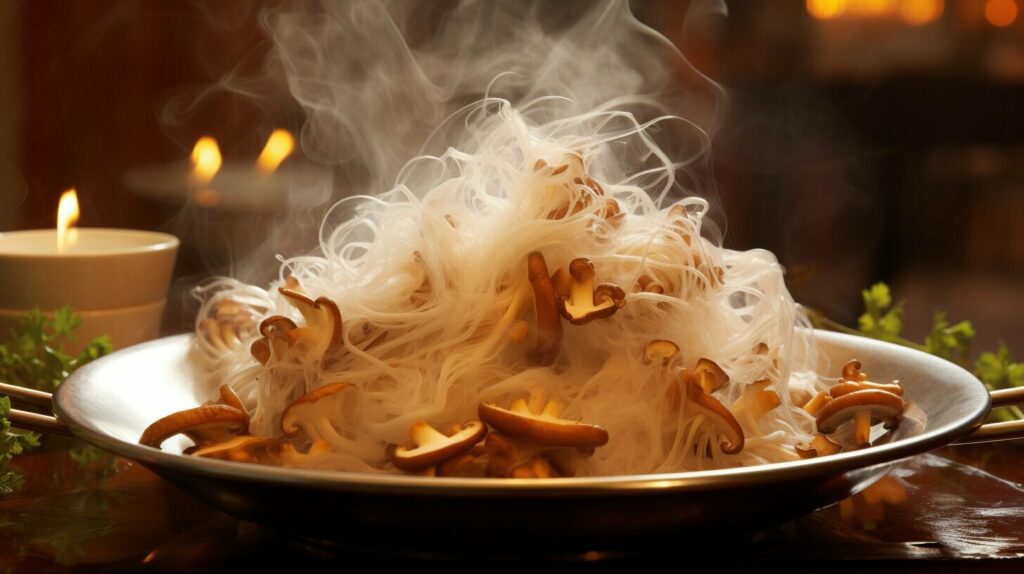
Lastly, cooking Lion’s Mane mushrooms allows for the release of their beneficial nutrients. While Lion’s Mane mushrooms offer various health benefits, including cognitive function improvement, immune system support, and anti-inflammatory properties, these benefits are more readily available when the mushrooms are cooked. The heat helps break down the cell walls, allowing for better nutrient absorption during digestion.
In conclusion, while it is possible to eat Lion’s Mane mushrooms raw, cooking them brings numerous benefits, including enhanced flavor, improved digestibility, elimination of potential germs, and better nutrient availability. So why not try incorporating Lion’s Mane mushrooms into your next culinary adventure and experience the delicious rewards that cooking can bring?
Nutritional Benefits of Lion’s Mane
Lion’s Mane mushrooms offer various nutritional benefits, and cooking them allows for the release of these beneficial nutrients. These unique fungi are rich in essential vitamins and minerals, making them a valuable addition to a healthy diet.
One of the notable nutritional components of Lion’s Mane mushrooms is their high protein content. Protein is essential for various bodily functions, including muscle growth and repair, as well as the production of enzymes and hormones.
In addition to protein, Lion’s Mane mushrooms are a good source of several vitamins, including B vitamins like riboflavin, niacin, and pantothenic acid. These vitamins play crucial roles in energy metabolism and help maintain healthy skin, eyes, and hair.
Lion’s Mane mushrooms also contain minerals such as potassium, zinc, and selenium. Potassium is important for maintaining proper heart function and regulating blood pressure, while zinc and selenium are essential for a healthy immune system and antioxidant defense.
| Nutrient | Amount per 100g |
|---|---|
| Protein | 20g |
| Riboflavin (Vitamin B2) | 0.4mg |
| Niacin (Vitamin B3) | 10mg |
| Pantothenic Acid (Vitamin B5) | 5mg |
| Potassium | 400mg |
| Zinc | 5mg |
| Selenium | 8mcg |
With their distinct taste and nutritional benefits, Lion’s Mane mushrooms make a great addition to various recipes. Whether sautéed, grilled, or roasted, they add a unique flavor and texture to dishes. Explore the versatility of Lion’s Mane mushrooms and give your taste buds a delightful, nutritious treat!
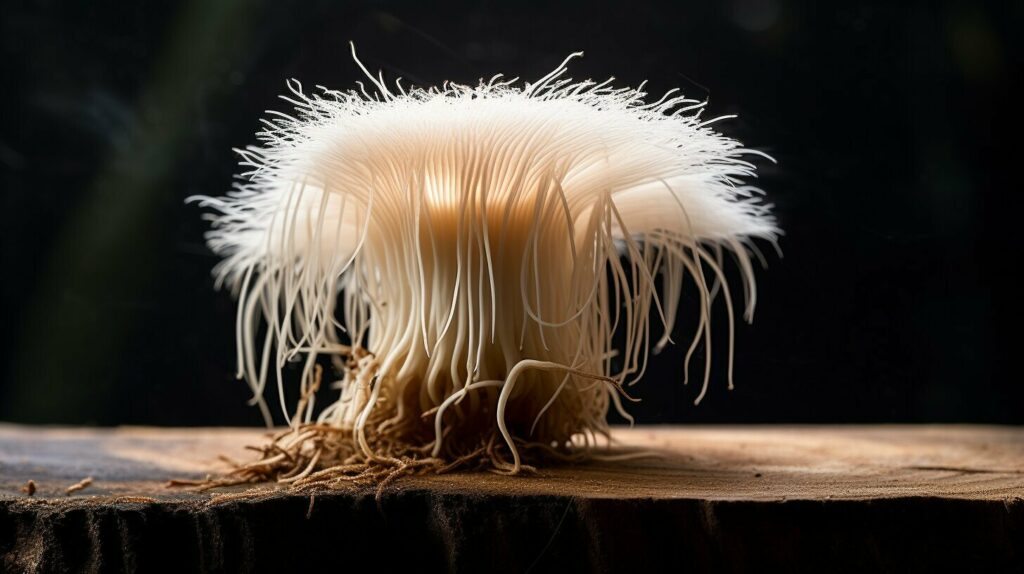
In addition to raw and cooked mushrooms, Lion’s Mane can also be found in dried or powdered forms, providing alternative ways to enjoy their unique flavor and benefits. Dried Lion’s Mane mushrooms offer a concentrated taste and texture, making them a great addition to soups, stews, and sauces. They can also be rehydrated by soaking them in warm water before use, regaining some of their original texture.
Powdered Lion’s Mane, on the other hand, can be easily incorporated into various dishes, such as smoothies, teas, and baked goods. The powder form allows for a more convenient and versatile use, offering a subtle earthy flavor to your recipes. It can be sprinkled over salads or added to seasonings for an extra boost of nutrients.
Table: Nutritional Comparison of Lion’s Mane in Different Forms
| Fresh | Dried | Powdered | |
|---|---|---|---|
| Protein (per 100g) | 3.3g | 26g | 25g |
| Fiber (per 100g) | 0.6g | 9.7g | 9.1g |
| Vitamin C (per 100g) | 3.5mg | 7.8mg | 6.9mg |
| Iron (per 100g) | 0.5mg | 4.3mg | 4.2mg |
The table above demonstrates the nutritional differences between fresh, dried, and powdered Lion’s Mane mushrooms. While the fresh variety contains a good amount of protein and fiber, the dried and powdered forms have significantly higher concentrations, making them a more concentrated source of nutrition.
Whether you choose dried or powdered Lion’s Mane, be sure to store them in a cool, dry place to maintain their quality and freshness. You can easily find these forms of Lion’s Mane mushrooms in health food stores or online retailers, allowing you to enjoy their benefits and unique flavor in a convenient and accessible way.
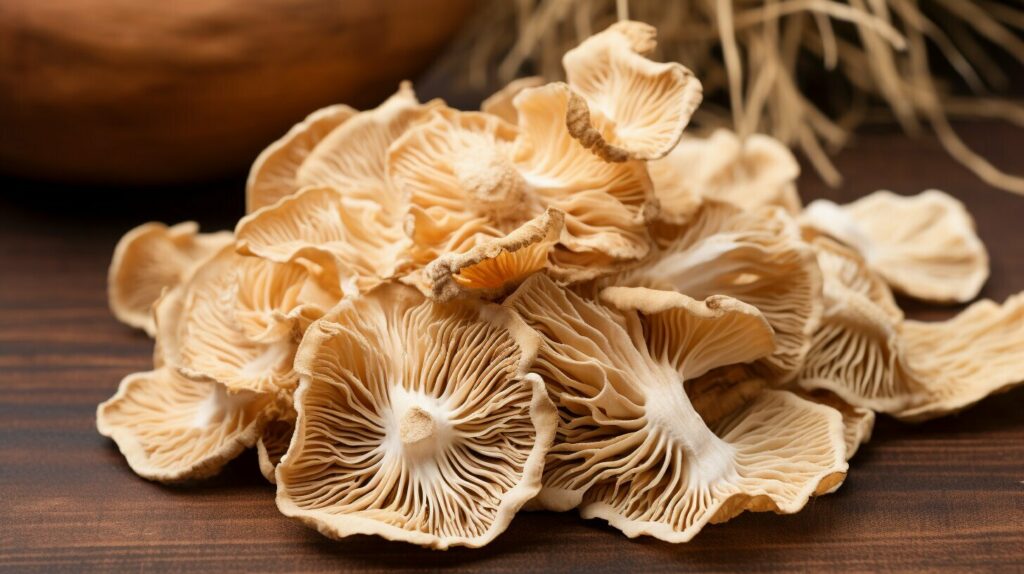
Ways to Cook Lion’s Mane
There are several delicious ways to cook Lion’s Mane mushrooms, including grilling, sautéing, roasting, and stir-frying. Each method infuses this unique mushroom with different flavors and textures, allowing you to explore its culinary versatility. Whether you prefer a smoky taste from grilling or the caramelized flavors from roasting, Lion’s Mane can be prepared to suit various palates and preferences.
Grilling Lion’s Mane mushrooms brings out a rich, earthy flavor that pairs well with other grilled vegetables or meats. Simply brush the mushrooms with olive oil, sprinkle with salt and pepper, and grill them over medium heat until they are tender and slightly charred. This method adds a delightful smoky note to the mushroom’s natural taste.
Sautéing Lion’s Mane mushrooms in butter or oil allows them to develop a golden brown crust while retaining their tender texture. Heat a pan over medium-high heat, add your preferred oil or butter, and toss in the Lion’s Mane mushrooms. Sauté them for a few minutes until they turn golden brown and crispy on the edges. This method complements the mushroom’s delicate flavor and creates a delightful contrast in texture.
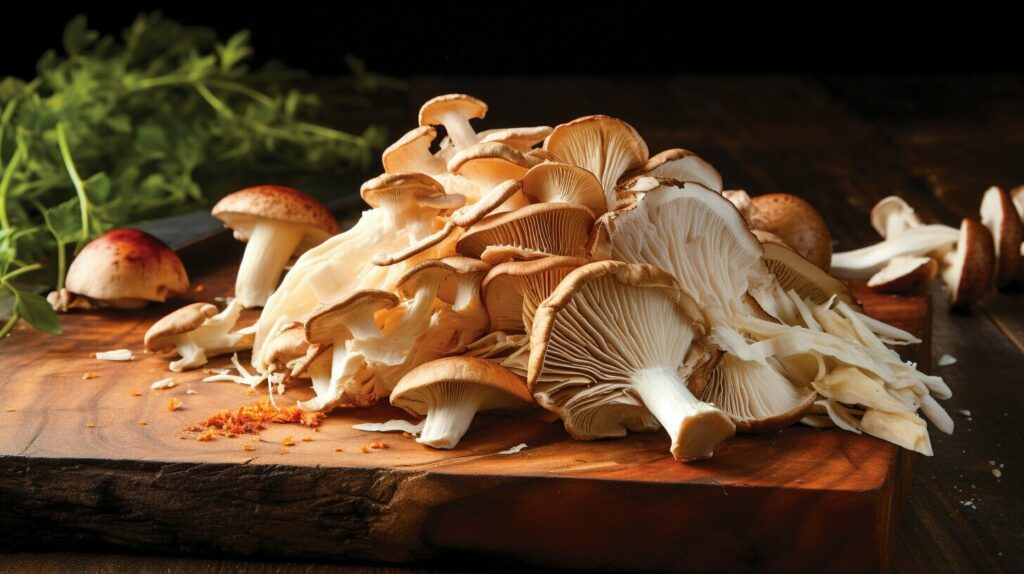
Roasting Lion’s Mane mushrooms is another great way to bring out their nutty and umami flavors. Preheat your oven to 400°F (200°C), toss the mushrooms in olive oil, salt, and any desired seasonings, and spread them on a baking sheet. Roast them for about 20 minutes, turning them halfway through, until they are tender and slightly crispy. The roasting process caramelizes the mushroom’s natural sugars, resulting in a mouthwatering flavor.
For a quick and flavorful option, stir-frying Lion’s Mane mushrooms is a fantastic choice. Heat a wok or skillet over high heat, add some oil, and throw in the mushrooms along with your favorite vegetables and seasonings. Stir-fry them for a few minutes until they are cooked through but still retain their bite. This method allows you to enjoy the mushroom’s unique taste while incorporating it into a stir-fry dish full of vibrant flavors.
Lion’s Mane Mushroom Recipes
Here are some mouth-watering recipes that showcase the unique flavor and versatility of Lion’s Mane mushrooms:
- Lion’s Mane Scramble: Start your day with a delicious and nutritious Lion’s Mane scramble. Sauté chopped Lion’s Mane mushrooms with onions, bell peppers, and garlic. Add a sprinkle of turmeric for color and anti-inflammatory benefits. Then, scramble in eggs or tofu for a protein-packed breakfast option. Serve with a side of whole-grain toast or fresh greens for a complete meal.
- Crispy Lion’s Mane Burger: Elevate your burger game with a crispy Lion’s Mane patty. Blend cooked Lion’s Mane mushrooms with black beans, breadcrumbs, and your favorite seasonings. Form into patties and pan-fry until golden brown and crispy. Serve on a whole wheat bun with avocado, lettuce, tomato, and your choice of condiments for a satisfying vegetarian burger option.
- Lion’s Mane Stir-Fry: Create a flavorful and nutritious stir-fry using Lion’s Mane mushrooms. Sauté sliced mushrooms with a medley of colorful vegetables like broccoli, carrots, and snap peas. Add a savory sauce made from soy sauce, ginger, garlic, and a touch of honey or maple syrup. Serve over steamed rice or noodles for a quick and healthy weeknight dinner.
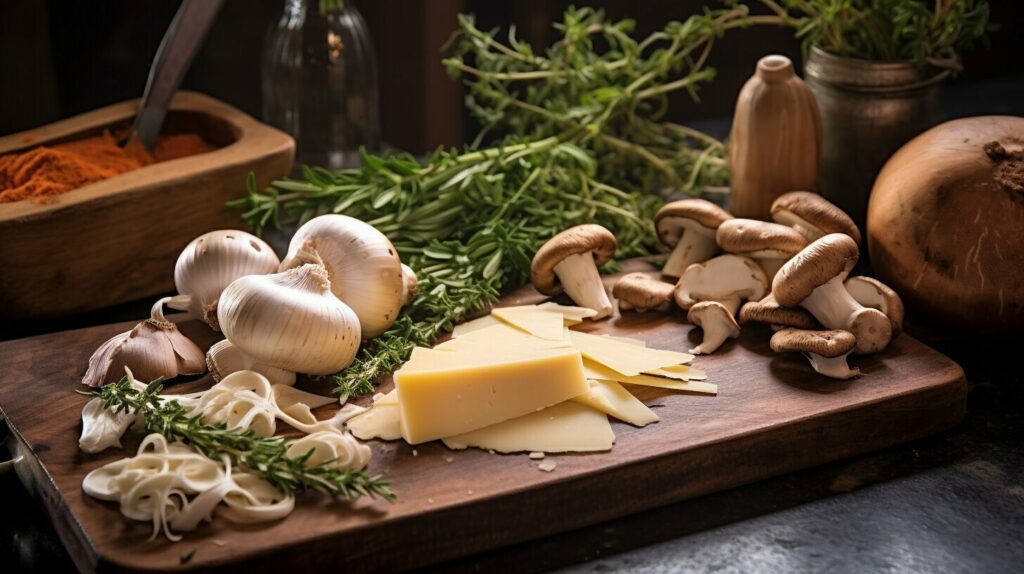
These recipes are just a starting point when it comes to the culinary possibilities of Lion’s Mane mushrooms. Feel free to experiment and get creative in the kitchen to discover your own favorite dishes featuring this unique and delicious fungi.
Health Benefits of Lion’s Mane
Lion’s Mane mushrooms have been associated with several health benefits, including cognitive function improvement, immune system support, and anti-inflammatory properties. These unique fungi contain bioactive compounds, such as erinacines and hericenones, which are believed to contribute to their medicinal properties.
Studies have shown that Lion’s Mane mushrooms may have a positive impact on brain health. Research suggests that the bioactive compounds found in Lion’s Mane can stimulate the production of nerve growth factor (NGF), a protein that plays a crucial role in the growth and maintenance of neurons. By promoting the growth of new neurons and protecting existing ones, Lion’s Mane mushrooms may help enhance cognitive function, memory, and overall brain health.
In addition to their cognitive benefits, Lion’s Mane mushrooms are also known for their immune-boosting properties. They contain polysaccharides, which are known to enhance the activity of immune cells and strengthen the immune system’s response to infections and diseases. Consuming Lion’s Mane mushrooms regularly may help support a healthy immune system and reduce the risk of certain illnesses.
Furthermore, Lion’s Mane mushrooms have been found to have anti-inflammatory effects. Chronic inflammation is believed to be a contributing factor to many chronic diseases, including heart disease, diabetes, and certain types of cancer. The bioactive compounds in Lion’s Mane mushrooms have shown potential in reducing inflammation and may have a protective effect against these diseases.

| Health Benefits of Lion’s Mane Mushrooms | Recommended Daily Intake |
|---|---|
| Improved cognitive function | Varies depending on individual needs |
| Enhanced immune system | Varies depending on individual needs |
| Reduced inflammation | Varies depending on individual needs |
Tips for Selecting and Storing Lion’s Mane
To ensure the best quality and flavor, follow these tips when selecting and storing fresh Lion’s Mane mushrooms.
1. Choose firm and intact mushrooms: When selecting Lion’s Mane mushrooms, look for specimens that are firm to the touch and free from any soft spots or bruises. The mushroom should feel solid and have a fresh, earthy scent. Avoid mushrooms that appear slimy or have a strong, unpleasant odor.
2. Store them properly: Lion’s Mane mushrooms are best stored in a paper bag or a loosely sealed container in the refrigerator. Avoid storing them in plastic bags, as these can trap moisture and cause the mushrooms to become slimy or moldy. The ideal temperature for storing Lion’s Mane mushrooms is between 32°F and 36°F (0°C and 2°C). Store them away from strong-smelling foods, as they can absorb odors easily.
| Selection Tips | Storage Tips |
|---|---|
| Choose firm and intact mushrooms | Store in a paper bag or loosely sealed container |
| Avoid soft spots, bruises, or sliminess | Avoid plastic bags and keep away from strong-smelling foods |
| Look for fresh, earthy scent | Keep at a temperature of 32°F to 36°F (0°C to 2°C) |
3. Use them promptly: Lion’s Mane mushrooms are best consumed within a few days of purchase to enjoy their optimal flavor and texture. While they may be safe to eat beyond this timeframe, their quality may start to decline, and they can become mushy or develop mold. If you’re unable to use them within a few days, consider freezing them to extend their shelf life.
By following these tips, you can ensure that your Lion’s Mane mushrooms stay fresh and delicious for longer, allowing you to enjoy the unique flavors and nutritional benefits they offer.
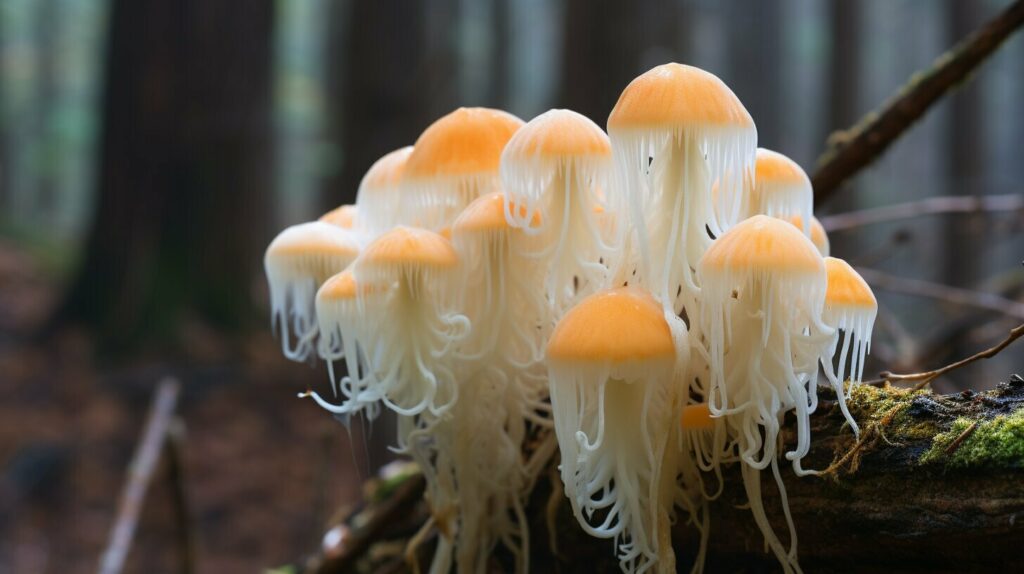
While Lion’s Mane mushrooms are generally safe to consume, it is important to be aware of some safety precautions to ensure a positive experience. Here are some key safety tips to keep in mind:
- Proper Identification: It is essential to correctly identify Lion’s Mane mushrooms before consumption. While they have distinct physical characteristics, it is always best to consult a knowledgeable expert or guidebook to avoid any potential risks.
- Allergic Reactions: Like other mushrooms, some individuals may develop allergic reactions to Lion’s Mane mushrooms. If you are trying them for the first time, start with a small portion to test your tolerance. If you experience any adverse symptoms like itching, rashes, or difficulty breathing, discontinue consumption and seek medical attention.
- Hygiene and Cleaning: Raw mushrooms, including Lion’s Mane, can harbor dirt, debris, or potential pathogens. It is crucial to thoroughly clean them before cooking or consuming. Gently wash them under running water, removing any dirt or unwanted particles with a soft brush.
- Storage: To maintain the quality and freshness of Lion’s Mane mushrooms, proper storage is essential. Store them in a paper bag or a breathable container in the refrigerator. Avoid using plastic bags as they can trap moisture and cause decay.
- Cooking: Although Lion’s Mane mushrooms can be eaten raw, cooking them is recommended for better taste, texture, and safety. Cooking helps eliminate any potential germs or harmful bacteria that may be present on raw mushrooms.
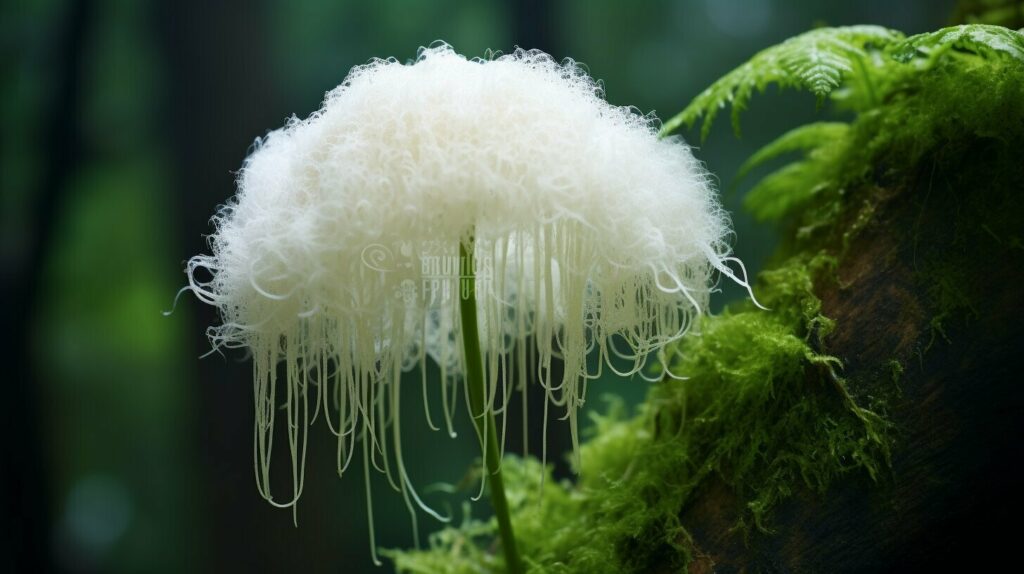
By following these safety precautions, you can enjoy the unique flavor and numerous health benefits of Lion’s Mane mushrooms with confidence. Remember to always source your mushrooms from reliable sources and consult a healthcare professional or mycologist if you have any concerns or questions.
| Safety Precautions | Benefits |
|---|---|
| Proper Identification | – |
| Allergic Reactions | – |
| Hygiene and Cleaning | – |
| Storage | – |
| Cooking | – |
Overall, Lion’s Mane mushrooms are a safe and delicious addition to your culinary repertoire, as long as you take the necessary precautions and use them responsibly. Explore various cooking methods and recipes to fully enjoy their unique taste and reap their potential health benefits. Happy mushroom foraging and happy eating!
Lion’s Mane as a Culinary Delight
Lion’s Mane mushrooms have become a sought-after culinary delight due to their distinctive taste, versatility, and growing popularity among chefs and food enthusiasts. These mushrooms, also known as Hericium erinaceus, are known for their unique appearance, resembling a lion’s mane with cascading white tendrils. But it’s not just their striking appearance that makes them special; it’s their flavorful and meaty taste that sets them apart from other mushrooms.
When cooked, Lion’s Mane mushrooms have a texture that is often compared to seafood, with a tender and juicy bite. This makes them an excellent substitute for meat in vegetarian and vegan dishes, offering a satisfying and umami-rich experience. Their mild and slightly sweet flavor can be enhanced with various seasonings and spices, allowing for endless culinary creativity.
| Taste: | Texture: |
|---|---|
| Slightly sweet | Tender and juicy |
| Umami-rich | Comparable to seafood |
Whether sautéed, roasted, grilled, or stir-fried, Lion’s Mane mushrooms bring a delightful depth of flavor to any dish. They can be used as a primary ingredient or added as a flavorful accent to soups, stews, pasta dishes, salads, and more. Their versatility lends itself well to both simple and elaborate recipes, making them a favorite among home cooks and professional chefs alike.
So why not explore the culinary wonders of Lion’s Mane mushrooms and discover how their unique taste and texture can elevate your dishes to new heights? With their growing availability in supermarkets and specialty stores, you’ll have no trouble finding these culinary gems to tantalize your taste buds and impress your dining companions.
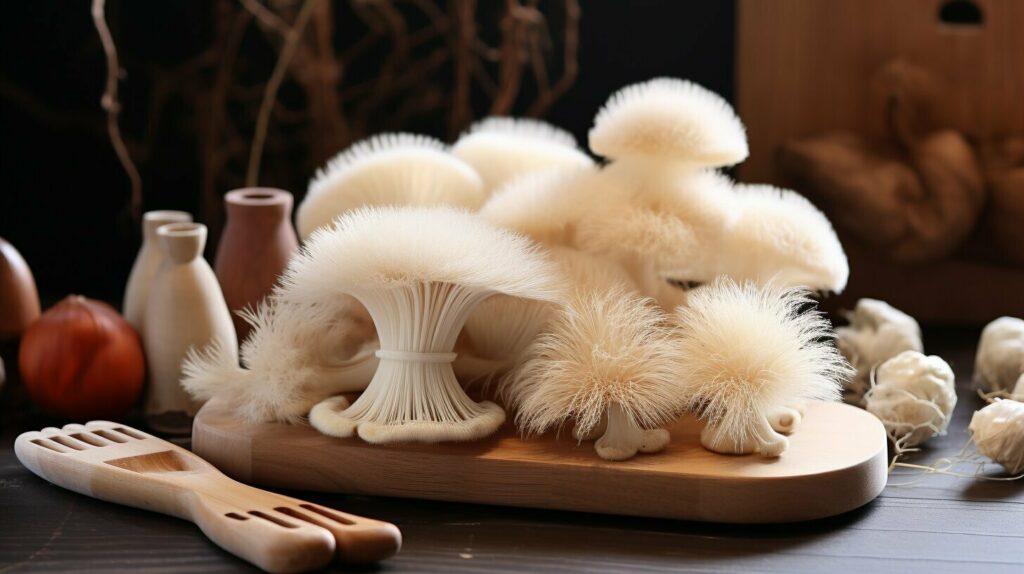
Conclusion
In summary, while it is possible to eat Lion’s Mane mushrooms raw, most people prefer to cook them for better taste and texture, unlocking their full flavor and nutritional benefits.
When consumed raw, Lion’s Mane mushrooms can have a slightly bitter flavor and a tough and fibrous texture. Cooking them helps enhance their taste and breaks down their cell walls, making them easier to digest. Additionally, cooking eliminates any potential germs present on raw mushrooms, ensuring a safe consumption.
Furthermore, cooking Lion’s Mane mushrooms allows for the release of their beneficial nutrients. This unique fungi is known for its potential health benefits, including improvements in cognitive function, support to the immune system, and anti-inflammatory properties.
While raw consumption is safe, to fully enjoy the delicious taste and reap the numerous nutritional benefits, it is recommended to cook Lion’s Mane mushrooms or utilize dried or powdered forms. These alternative forms can be used in various dishes, adding a savory and nutritious touch to your culinary creations.
FAQ
Q: Can you eat Lion’s Mane raw?
A: Yes, Lion’s Mane mushrooms can be eaten raw, but most people prefer to cook them for better taste and texture.
Q: What is the taste and texture of raw Lion’s Mane?
A: Raw Lion’s Mane mushrooms have a slightly bitter flavor and a tough and fibrous texture.
Q: What are the benefits of cooking Lion’s Mane?
A: Cooking Lion’s Mane enhances their flavor, breaks down their cell walls for easier digestion, eliminates potential germs, and releases beneficial nutrients.
Q: Are there nutritional benefits to consuming Lion’s Mane?
A: Yes, Lion’s Mane mushrooms provide various nutritional benefits and can contribute to a healthy diet.
Q: Can you use dried or powdered Lion’s Mane as an alternative?
A: Yes, dried or powdered forms of Lion’s Mane can be used as alternatives to raw or cooked mushrooms. They can be incorporated into dishes in various ways.
Q: What are some ways to cook Lion’s Mane?
A: Lion’s Mane can be grilled, sautéed, roasted, and stir-fried. They can be seasoned and paired with other ingredients for delicious dishes.
Q: Are there any specific Lion’s Mane mushroom recipes?
A: Yes, there are various recipes featuring Lion’s Mane mushrooms, both vegetarian and non-vegetarian options are available.
Q: What are the health benefits of Lion’s Mane?
A: Consuming Lion’s Mane mushrooms may provide benefits such as cognitive function improvement, immune system support, and anti-inflammatory properties.
Q: Any tips for selecting and storing Lion’s Mane?
A: When selecting Lion’s Mane, choose firm and intact mushrooms. Store them properly to maintain their quality.
Q: Are there any safety precautions when handling Lion’s Mane mushrooms?
A: It’s important to be aware of potential allergic reactions, properly identify mushrooms, and consult with a healthcare professional if uncertain.
Q: Why are Lion’s Mane mushrooms considered a culinary delight?
A: Lion’s Mane mushrooms are prized for their unique taste, versatility in various dishes, and growing popularity among chefs and food enthusiasts.

